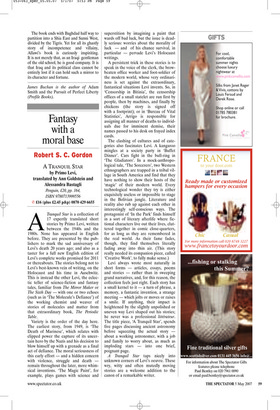Fantasy with a moral base
Robert S. C. Gordon
A TRANQUIL STAR by Primo Levi, translated by Ann Goldstein and Alessandra Bastagli Penguin, £20, pp. 164, ISBN 9780713999556 ✆ £16 (plus £2.45 p&p) 0870 429 6655 ATranquil Star is a collection of 17 expertly translated short stories by Primo Levi, written between the 1940s and the 1980s. None has appeared in English before. They are presented by the publishers to mark the sad anniversary of Levi’s death 20 years ago; and also as a taster for a full new English edition of Levi’s complete works promised for 2011 or thereabouts. The stories belong not to Levi’s best-known vein of writing, on the Holocaust and his time in Auschwitz. This is instead the other Levi, the eclectic teller of science-fiction and fantasy tales, familiar from The Mirror Maker or The Sixth Day — with one or two echoes (such as in ‘The Molecule’s Defiance’) of the working chemist and weaver of stories of molecules and matter from that extraordinary book, The Periodic Table.
Variety is the order of the day here. The earliest story, from 1949, is ‘The Death of Marinese’, which relates with clipped power the capture of its uncertain hero by the Nazis and his decision to blow himself up with a grenade as a final act of defiance. The moral seriousness of this early effort — and a hidden concern with violence, struggle and death remain throughout the later, more whimsical inventions. ‘The Magic Paint’, for example, plays games with science and superstition by imagining a paint that wards off bad luck, but the issue is deadly serious: worries about the morality of luck — and of his chance survival, in particular — pervade Levi’s Holocaust writings.
A persistent trick in these stories is to speak in the voice of the clerk, the browbeaten office worker and foot-soldier of the modern world, whose very ordinariness is set against the extraordinary, fantastical situations Levi invents. So, in ‘Censorship in Bitinia’, the censorship offices of a small statelet are run first by people, then by machines, and finally by chickens (the story is signed off with a footprint); or in ‘Bureau of Vital Statistics’, Arrigo is responsible for assigning all manner of deaths to individuals due for imminent demise, their names passed to his desk on frayed index cards.
The clashing of cultures and of categories also fascinates Levi. A kangaroo mingles at a society party in ‘Buffet Dinner’. Cars fight in the bull-ring in ‘The Gladiators’. In a mock-anthropological tale, ‘The Sorcerers’, two Western ethnographers are trapped in a tribal village in South America and find that they have nothing to show their hosts of the ‘magic’ of their modern world. Every technological wonder they try is either exquisitely useless or impossible to stage in the Bolivian jungle. Literature and reality also rub up against each other in interestingly self-conscious ways. The protagonist of ‘In the Park’ finds himself in a sort of literary afterlife where fictional characters live out their lives, cluttered together in comic close-quarters, for as long as they are remembered in the real world. As their fame fades, though, they find themselves literally fading away into thin air. (This story really needed its companion piece, called ‘Creative Work’, to fully make sense.) Levi always wrote most naturally in short forms — articles, essays, poems and stories — rather than in sweeping grand narratives, and, for this reason, the collection feels just right. Each story has a small kernel to it — a turn of phrase, a memory, a fantastic invention, a strange meeting — which jolts or moves or raises a smile. If anything, their impact is heightened by the slightly unpolished or uneven way Levi shaped out his stories; he never was a professional littérateur. The title piece, ‘A Tranquil Star’, spends five pages discussing ancient astronomy before squeezing the actual story about a working astronomer, with a job and family to worry about, as much as imploding stars — into one brief, poignant page.
A Tranquil Star taps nicely into unknown corners of Levi’s oeuvre. These wry, witty and often mutedly moving stories are a welcome addition to the canon of a remarkable writer.


































































































 Previous page
Previous page